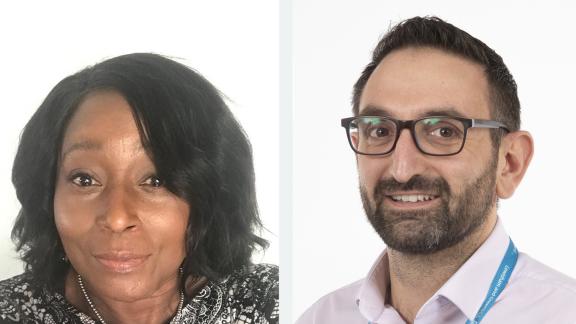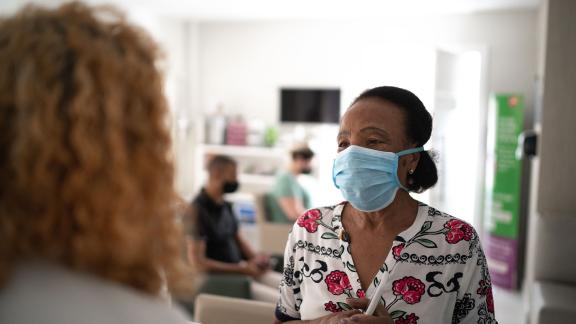Diversifying the upper levels of the health service

Eric Pirozzoli and Fay Blackwood explain how they are increasing diversity in senior roles to better reflect the diversity of their workforce and communities they serve.
At Lewisham and Greenwich, we see our diversity as a key strength: 79 per cent of our staff are female, 61 per cent are from ethnic minority communities, 4.5 per cent have disabilities, and 3 per cent identify as LGBTQ+.
However, like many others, we have faced problems. An independent review in 2018 highlighted severe issues of bullying and discrimination, particularly affecting minoritised groups. HR practices were criticised for being unfair, ineffective and tolerant of bullying behaviours, all of which impacted career progression and led to low confidence among staff.
“…while we critically depended upon being able to recruit and retain a diverse body of staff, we were neither conducting those recruitment processes in a fair way, nor were we treating staff properly upon entering the organisation”
This perversely meant that while we critically depended upon being able to recruit and retain a diverse body of staff, we were neither conducting those recruitment processes in a fair way, nor were we treating staff properly upon entering the organisation or giving them equal opportunities to develop their careers with us.
We know anecdotally that applicants are increasingly paying attention to staff satisfaction ratings and voting with their feet when they think they can find a better working environment.
We also know that if we do not nurture a workforce that reflects the diversity of the communities that we serve, we will never be able to address the many health inequalities faced by our residents.
Our role as people leaders is to make staff feel welcome and valued, because when we do that it is better for the trust and the patients who depend on our services.
Implementing cultural change
So, we have been leading on a massive programme of cultural change to make this happen – forming a Respect, Compassion and Inclusion Programme Board, chaired by our CEO and chief people officer, with representatives from operational and clinical leads across all staff groups, networks, wellbeing champions and unions. This has led to us implementing a two-year action plan for change, which over time has included the 121 distinct actions in our EDI plan, 82 of which have already become business as usual.
“…we had to remove barriers to ambition – discriminatory practices that prevented staff from getting a fair chance”
But what about the key issue: getting more people from black, Asian and minority ethnic backgrounds into leadership positions? Well, we saw this as a combination of two factors.
First, we had to remove barriers to ambition – discriminatory practices that prevented staff from getting a fair chance. Second, we worked on support, giving colleagues from ethnic minority backgrounds help to reach their goals.
On the barriers, we completely overhauled our recruitment practices to ensure uniformity and fairness. We introduced EDI-focused recruitment training for hiring managers, defining their responsibilities and accountabilities. Additionally, rather than simply having black, Asian and minority ethnic representatives on interview panels, we introduced a new equality advocate role following feedback on what wasn’t working. Our equality advocates participate as equal members of the interview panel and have the authority to veto unfair recruitment decisions. We also revamped our overall employee relations processes to ensure transparency and to make sure that we are clearly communicating our position of zero tolerance on discrimination.
When it comes to support, we introduced CV, interview and career coaching, which is now available to all staff from band 2 upwards. In addition, specific coaching and mentoring opportunities are offered to all unsuccessful internal applicants from minority groups, ensuring that anyone who does not succeed in their first attempt at progression is empowered to better take advantage of future opportunities. We also use the Scope for Growth Framework to facilitate career conversations between line managers and their staff, which supports colleagues to think in different ways about their development plans.
Together, these approaches are making a real difference.
Achieving tangible change
The representation of ethnic minorities in roles at band 8A and above has nearly doubled from 19 per cent to 36.4 per cent. Our coaching service has been accessed by 254 members of staff, 61 per cent of which are from minority backgrounds, and our Workforce Race Equality Standards (WRES) indicators also show sustained improvement in staff engagement and their experience of discrimination.
“We hear from hiring managers that the quality of applicants has greatly improved. It is now easier to fill vacancies and consequently we are spending less on agency staff”
We hear from hiring managers that the quality of applicants has greatly improved. It is now easier to fill vacancies and consequently we are spending less on agency staff, so this is genuinely having a measurable impact on the running of our services. People truly feel more positive about working for us, and with higher quality applicants comes better care for patients. It also means a higher degree of cultural and racial literacy, which is critical for addressing health inequalities.
Clearly, with 61 per cent of our staff from ethnic minority backgrounds, there is still more to do.
It’s fair to say that we have both learned that this agenda is complex and requires individual and organisational tenacity, humility and a real commitment to learn. But we are incredibly proud of how rapidly we have made progress, and we intend to continue making gains through to 2025–2027 with a new two-year action plan.
We are personally grateful for the engagement of so many people at our trust who care deeply about getting this right, who have taken the time to share their stories, listen to each other, review the data and take action to deliver multiple strands of work which weave together to really make an impact.
Eric Pirozzoli is deputy chief people officer, and Fay Blackwood is associate director of organisational development, equality and inclusion, at Lewisham and Greenwich NHS Trust.



